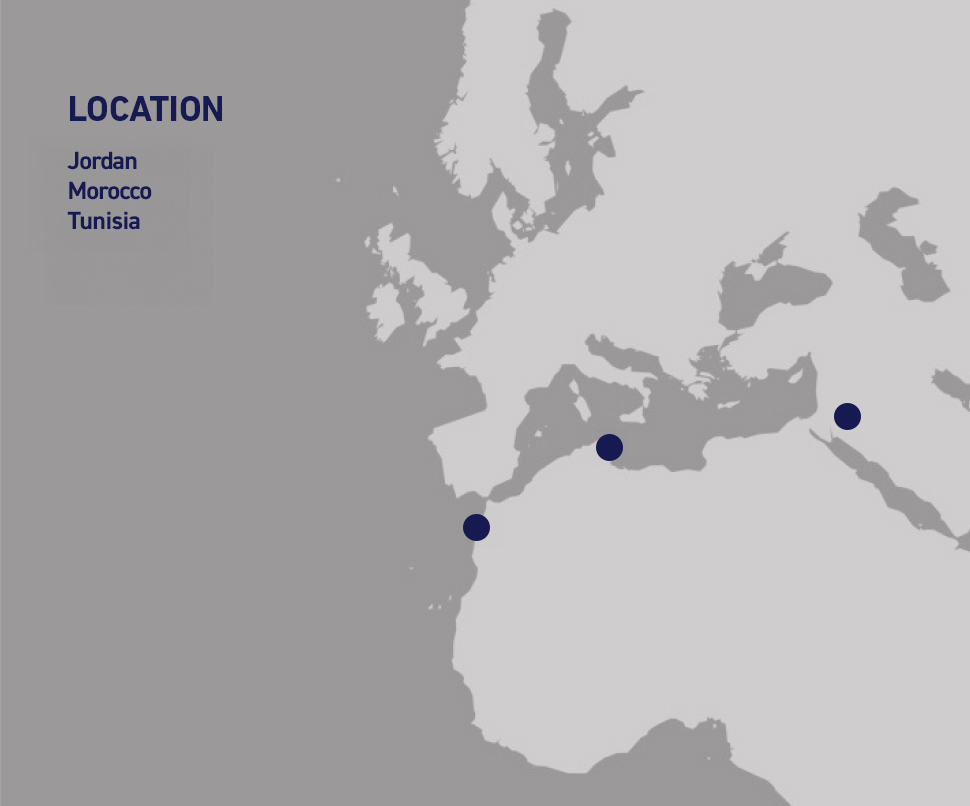
Women on the Green Path (WGP)
Context and objectives
The project Women on the Green Path’s main goal is to empower women by promoting their employment and entrepreneurship opportunities in the green circular economy in Jordan, Morocco, and Tunisia. The initiative aims at improving economic opportunities for women, increasing gender equality and social inclusion, and promoting sustainable practices.
Transitioning towards a green economy has become a common objective within the Mediterranean region to overcome pressing challenges caused by climate change. However, insufficient funds, skills mismatch, and lack of alignment between national policies, legal frameworks and ground-based projects deter the transition towards a green and circular economy.
Moreover, the lack of targeted policies, regulations, and support mechanisms tailored to the specific needs of women entrepreneurs in these sectors can limit their opportunities for growth and impact. Indeed, inadequate policies and scarce institutional support for the promotion of gender equality and women participation in the green and circular economy can hinder progress towards more sustainable societies.
Green economy has great potential for women’s employment and entrepreneurship. Women are already active in relevant fields like tourism, agriculture, and handcraft, especially in rural areas where climate change puts pressure on households and pushes the most vulnerable to migrate. Consequently, women can become multipliers and levers for climate action and sustainable income generation.
In this context, the project’s main objectives are to support women entrepreneurs in the green sector through training programmes, networking platforms and by showcasing success stories. Overall, Women on the Green Path strives to empower women to overcome gender related barriers, contribute to sustainable development in their communities, and drive green and circular economic growth. By adopting sustainable practices, women entrepreneurs will reduce waste, utilize resources efficiently, and preserve natural resources.
Location

Key figures
Duration:
12 months
Countries:
3
Budget for the action:
375,000.00 EUR
Grant awarded:
300,000.00 EUR
Promoter
Centre of Arab Women for Training and Research (CAWTAR)
The Centre of Arab Women for Training and Research (CAWTAR) was created in 1993, in response to the desire expressed by several Arab stakeholders, including local, regional, and international institutions as well as governments, to establish a centre of academic research and field studies relating to women’s conditions.
In addition to collecting data, indicators, and statistics on women’s economic, social, and political conditions, CAWTAR significantly contributes to capacity building of stakeholders, enhancing networking, building strategic partnership, and strengthening advocacy for women’s rights.
Beneficiaries
- More than 45 enablers, business support organisations, incubators, accelerators, public institutions, private sector organisations, decision makers and NGOs acting in the green and circular economy.
- 60 Women entrepreneurs (20 by country) operating within the green and circular economy in Jordan, Morocco, and Tunisia.
Key actions
Conducting training programs and workshops to enhance women’s skills and knowledge in sustainable practices, circular economy principles, and green technologies. This will include an acceleration programme for 60 women entrepreneurs in the selected countries.
Networking and Mentorship: through facilitating networking opportunities for women entrepreneurs in the green and circular economy to connect and share experiences. Coaching and mentoring will be provided for 15 champion MSMEs to support their green transition plan.
Capacity building sessions (training of trainers) for accelerators, incubators, and entrepreneurship support actors so that they can be vectors of gender integration in the green and circular economy.
Advocacy and policy engagement through 3 policy briefs that will be shared with targeted institutions to support programmes and initiatives for women entrepreneurs.
Organisation of 3 national workshops involving parliamentarians, entrepreneurial ecosystem actors, decision makers and media.
Developing a practical handbook to support the transition to a gender-based green and circular economy and producing a regional report on the efforts made in the three countries towards said transition.
Documenting success stories and good practices and produce guidelines for the benefit of entrepreneurs and SMEs, capitalising on lessons learned.
Produce a directory of incubators, accelerators and actors providing technical support, funding, and services to entrepreneurs in the green and circular economy sector.
Expected results
60 Women Entrepreneurs in green /circular economy benefit from a comprehensive acceleration program.
15 women Entrepreneurs leading projects in green/circular economy are selected to benefit of adapted services’ packs.
15 women entrepreneurs in green/circular economy benefit from mentoring program to reinforce / implement their businesses.
1 regional networking event is organised gathering ecosystem actors and the women entrepreneurs supported from South and North.
Overall higher number of women engaged in employment, entrepreneurship, and leadership positions within the green and circular economy, along with the development of their skills and capabilities.
45 enablers and actors of the entrepreneurial ecosystems are trained to offer better support to women entrepreneurs in the green and circular economy.
